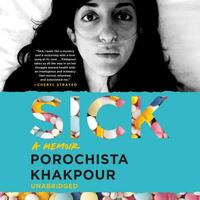Take a photo of a barcode or cover
challenging
dark
emotional
informative
mysterious
reflective
slow-paced
This might be my biggest reading disappointment of the year so far. I have been looking forward to this book for ages and when it finally arrived I jumped straight into reading it. I find the story Porochista Khakpour tells - of illness that went years without a diagnosis, about racism and sexism in medicine, about addiction and losing oneself - so very very important and relevant, but the execution just did not work for me. I found the structure of the book unhelpful, the jumping back and forth, sometimes within the same paragraph difficult to follow and frustrating, even though I can see how that could have worked wonderfully.
She says in the acknowledgments that she stripped her memoir of everything but herself - and maybe she was a bit too successful in that aim. I left the book not even quite knowing what Lyme Disease does to her, or what symptoms she had. Her encounters with medical doctor after medical doctor felt undefined and somehow left me confused - because I know she wanted me to see how godawful the doctors were (and I am sure they were) but I could only ever see her. I think some grounding in the reality of Lyme would have worked better for me.
My biggest problem was the prose, on a sentence-by-sentence level. I found it weirdly clumsy in parts, while sometimes being very profound. There were sentences however that I had to read multiple times to get to their meanings and I am not sure that was intentional.
She says in the acknowledgments that she stripped her memoir of everything but herself - and maybe she was a bit too successful in that aim. I left the book not even quite knowing what Lyme Disease does to her, or what symptoms she had. Her encounters with medical doctor after medical doctor felt undefined and somehow left me confused - because I know she wanted me to see how godawful the doctors were (and I am sure they were) but I could only ever see her. I think some grounding in the reality of Lyme would have worked better for me.
My biggest problem was the prose, on a sentence-by-sentence level. I found it weirdly clumsy in parts, while sometimes being very profound. There were sentences however that I had to read multiple times to get to their meanings and I am not sure that was intentional.
informative
sad
slow-paced
Khakpour bravely takes a look back at her life and how sickness invaded so much of it, making her question her intelligence, identity, and even her ability and desire to live. Yes, that makes it sound depressing and some of it is hard to read. But as someone who has wrestled with Lyme disease, I am so grateful that she took the time to write about her story handling her health and how she dealt with it. Even if she is still dealing with it and there isn't a true conclusion. For me, as someone who read this book because of Lyme, I think I wanted more of that battle. There is a lot setting the stage and telling Khakpour's life story which is told well but I must admit, I did spend some time waiting to see what would happen with Lyme and her journey now. I would probably read another book about her current journey through medicine and Lyme.
I stayed up late last night finishing Porochista Khakpour’s memoir of her life of intermittent unexplained illnesses, culminating in an eventual diagnosis of late-stage Lyme Disease. And now the usual conundrum - how do you talk about a book review after someone shares so deeply their life story? I was quite moved by Khakpour’s story, and I appreciate that she’s sharing a narrative that’s as yet still unresolved. I gather the original intention of this memoir was for it to be a story of post-remission triumph, but instead it wove itself into an extensive backstory with no concrete conclusion. Though she notes she stripped the story bare of details extraneous to her specific experience, I learned viscerally the experience of struggling with undiagnosed illness and the anguish of being dismissed by professionals as delusional about her physical symptoms. Khakpour speaks important words too about how race and gender factored into her experience of care. I’m grateful for this book and to Khakpour for sharing so personally a multifaceted journey with all its loose ends intact.
I really wanted to love this memoir. It was recommended by a friend and while I was enthralled with [roughly] the first half, the second half left me feeling completely ambivalent. First things first, I'm no stranger to listening to and supporting people with chronic illnesses that have been (still are) considered psychiatric or fake. I grew up with a Puerto Rican mother with lupus and I watched her struggle with doctors, with the healthcare system at large. Issues of race and gender within healthcare need to be discussed. Personal accounts of life with Lyme Disease are also needed. Such stories have the power to check preconceived notions of what illness should look like before it's taken seriously.
Unfortunately, this book was far less about Lyme Disease than I had anticipated. Instead it was a specter, haunting her life, addressed occasionally in between and amongst stories of drug use, partying, and failed relationships. I knew going in that Khakpour would be discussing things like addiction (another reason I read this, to be honest), and while I found some sections moving and profound, the way she wrote of coming to terms with what was happening within her own body had far too much interlude with a jumbled assortment of characters that I found hard to keep track of. I grew overly weary of reading about her slim frame, cigarettes, and rich boyfriends. If I wanted to infer the connections Khakpour was trying to make between her health and how she coped, of course, I can interpret this, especially based off the last bit of the book. But I found myself unconcerned about even making these inferences because it didn't seem that Khakpour found it particularly useful herself to discuss these things as coping mechanisms. The prose wavered far too close to infatuated glamorizing of starvation, wealthy whiteness, and partying. By the middle of the book (with at least 2 pointless but standout mentions of white boyfriends and living in the Lyme-carrying tick-infested Northeasteven though doctors (doctor?) said that's likely not where she got it from ), I found myself struggling to focus and my disinterest only increased.
To be sure I do feel that there are some incredibly important pieces to this memoir. Khakpour's prose was at times incredibly impactful and I could relate to how she wrote about addiction, mental illness issues (such as anxiety and depression and suicidal ideation), and coping mechanisms when you're in mental and physical anguish. Overall, though, the memoir lagged and the last quarter or so I had to keep going back because I simply could not keep timelines and people straight. I imagine for others, this memoir has the potential to carry the kind of personal meaning that I often read memoirs for, but unless you can perhaps relate to Lyme and her particular coping mechanisms, I'm not sure you'd get much out of this one. I didn't love it. I liked it, but I feel it will ultimately be forgettable.
Unfortunately, this book was far less about Lyme Disease than I had anticipated. Instead it was a specter, haunting her life, addressed occasionally in between and amongst stories of drug use, partying, and failed relationships. I knew going in that Khakpour would be discussing things like addiction (another reason I read this, to be honest), and while I found some sections moving and profound, the way she wrote of coming to terms with what was happening within her own body had far too much interlude with a jumbled assortment of characters that I found hard to keep track of. I grew overly weary of reading about her slim frame, cigarettes, and rich boyfriends. If I wanted to infer the connections Khakpour was trying to make between her health and how she coped, of course, I can interpret this, especially based off the last bit of the book. But I found myself unconcerned about even making these inferences because it didn't seem that Khakpour found it particularly useful herself to discuss these things as coping mechanisms. The prose wavered far too close to infatuated glamorizing of starvation, wealthy whiteness, and partying. By the middle of the book (with at least 2 pointless but standout mentions of white boyfriends and living in the Lyme-carrying tick-infested Northeast
To be sure I do feel that there are some incredibly important pieces to this memoir. Khakpour's prose was at times incredibly impactful and I could relate to how she wrote about addiction, mental illness issues (such as anxiety and depression and suicidal ideation), and coping mechanisms when you're in mental and physical anguish. Overall, though, the memoir lagged and the last quarter or so I had to keep going back because I simply could not keep timelines and people straight. I imagine for others, this memoir has the potential to carry the kind of personal meaning that I often read memoirs for, but unless you can perhaps relate to Lyme and her particular coping mechanisms, I'm not sure you'd get much out of this one. I didn't love it. I liked it, but I feel it will ultimately be forgettable.
This was immensely difficult to read- heartbreaking subject matter aside, I related to the absolute frustration of nor having a diagnosis/name of a thing one has been suffering, and I haven't dealt with a fraction of Porochista's experiences. An absolutely visceral read.
challenging
dark
emotional
sad
slow-paced
I 'read' the audiobook of this, and finished it in two sittings. A truly excellent memoir that explores dealing with undiagnosed chronic disease and battling addiction. I found a lot to identify with in this book, as I have also dealt with a chronic disease, the years-long quest for diagnosis - though on a much less extreme scale I am thankful to say. I would recommend this to anyone who wants to learn more about what the experience of having chronic disease is like. Khakpour is explicit that this is not a triumphal narrative, so be prepared for that.
Minor: Drug abuse, Sexual violence, Toxic relationship, Xenophobia
"The body is asking for something, and drugs deliver something, but rarely that thing the body needs. In the end, the needs of the body are unheard and another need opens to be filled. Drug make holes, so they can fill them for you later."
"... a tiny crumb, incandescent white, as if white was always pure, as if a pill was always medicinal, as if health was always treatable ..."
"... a tiny crumb, incandescent white, as if white was always pure, as if a pill was always medicinal, as if health was always treatable ..."
dark
sad
tense
medium-paced







